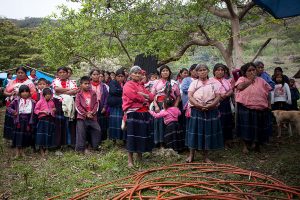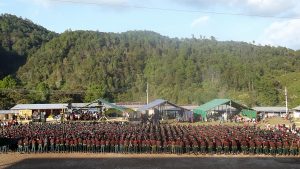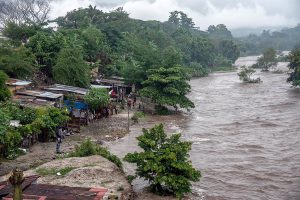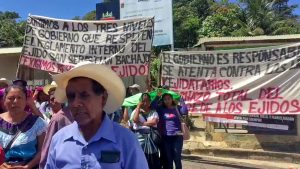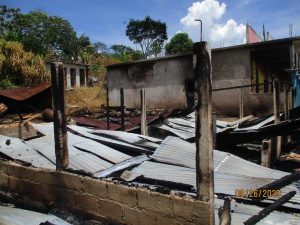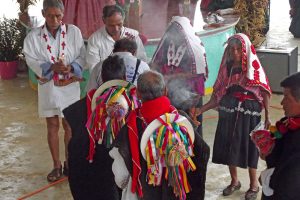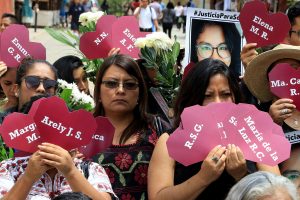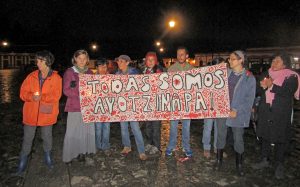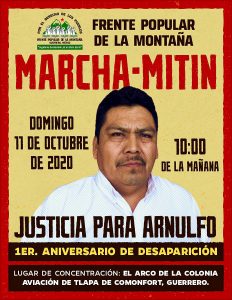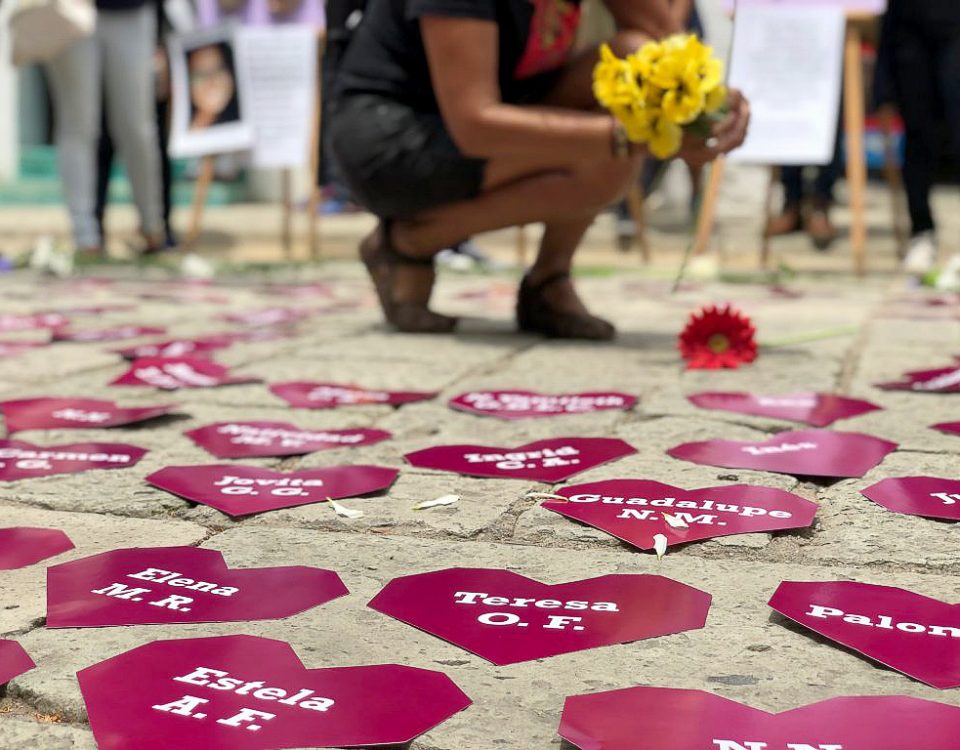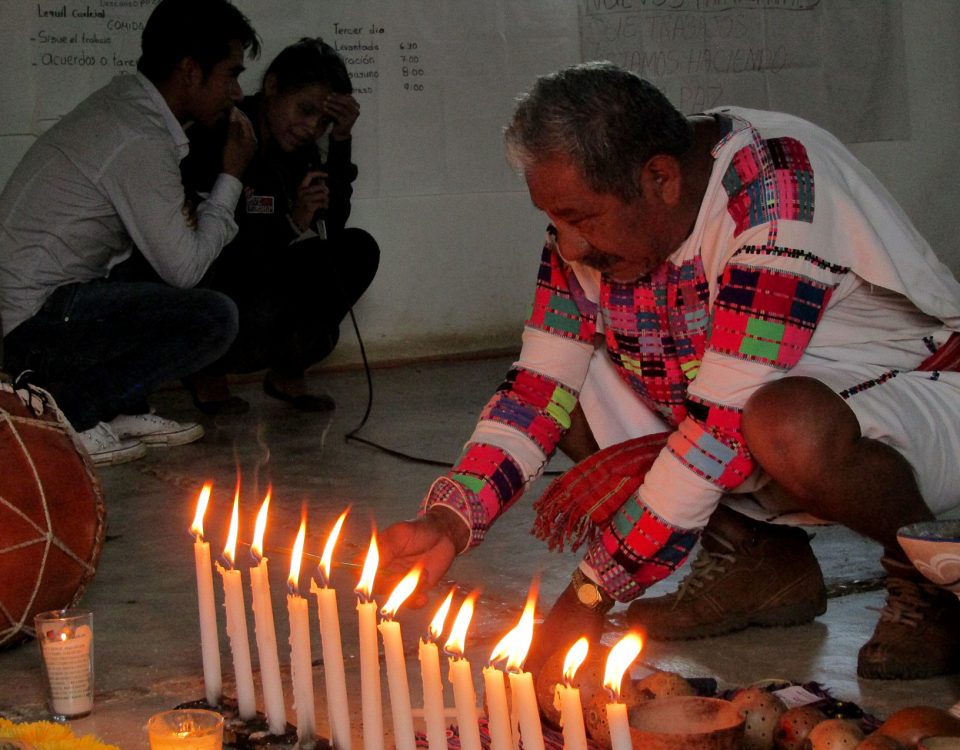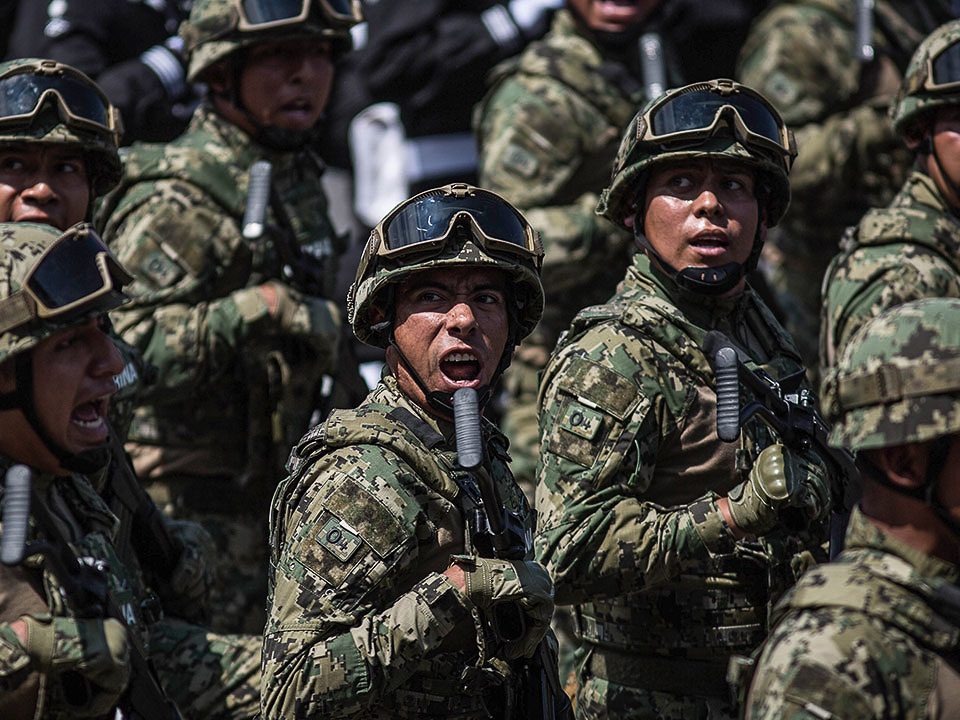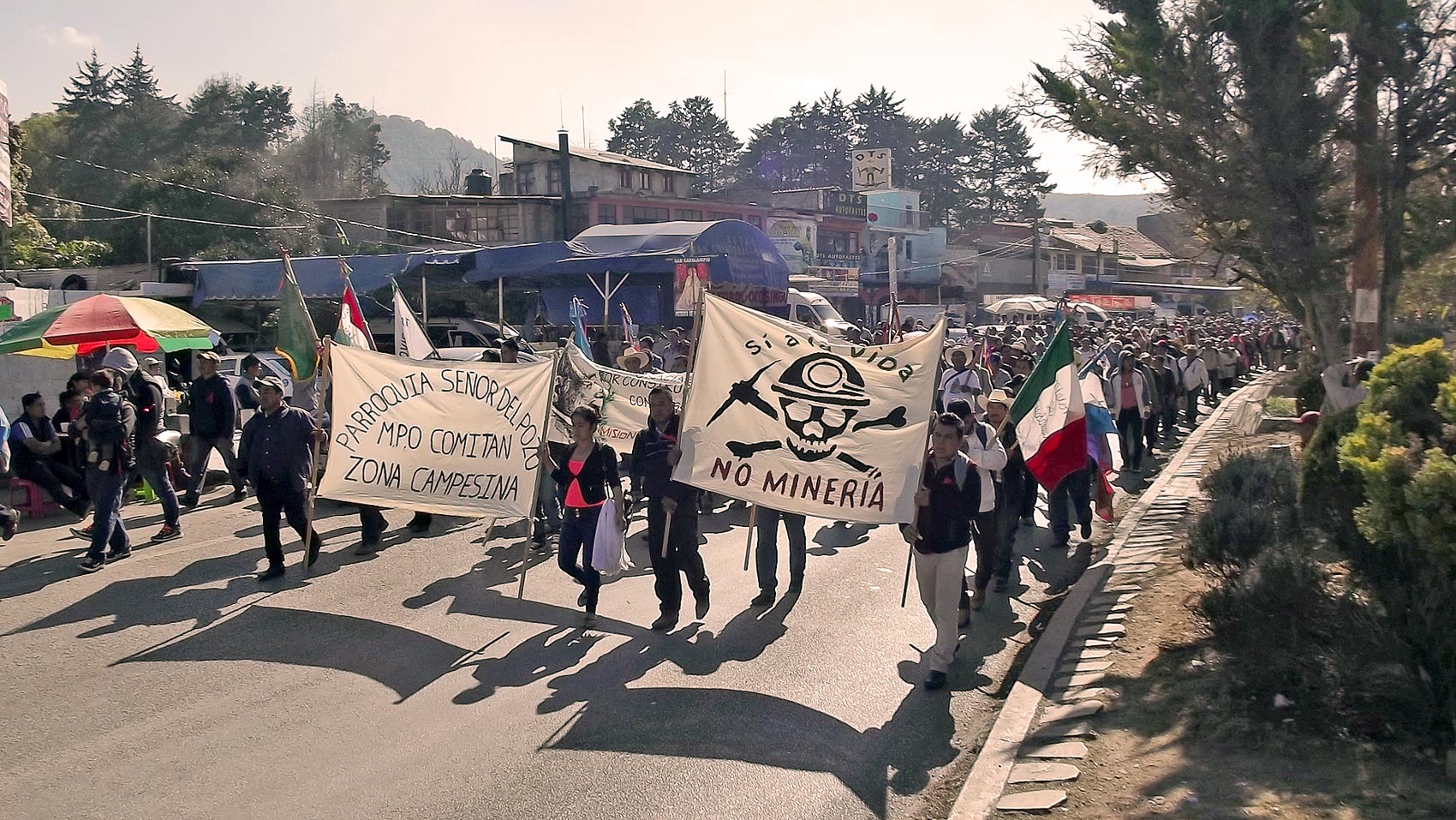
SIPAZ Activities (Mid-May to mid-August, 2020)
04/09/2020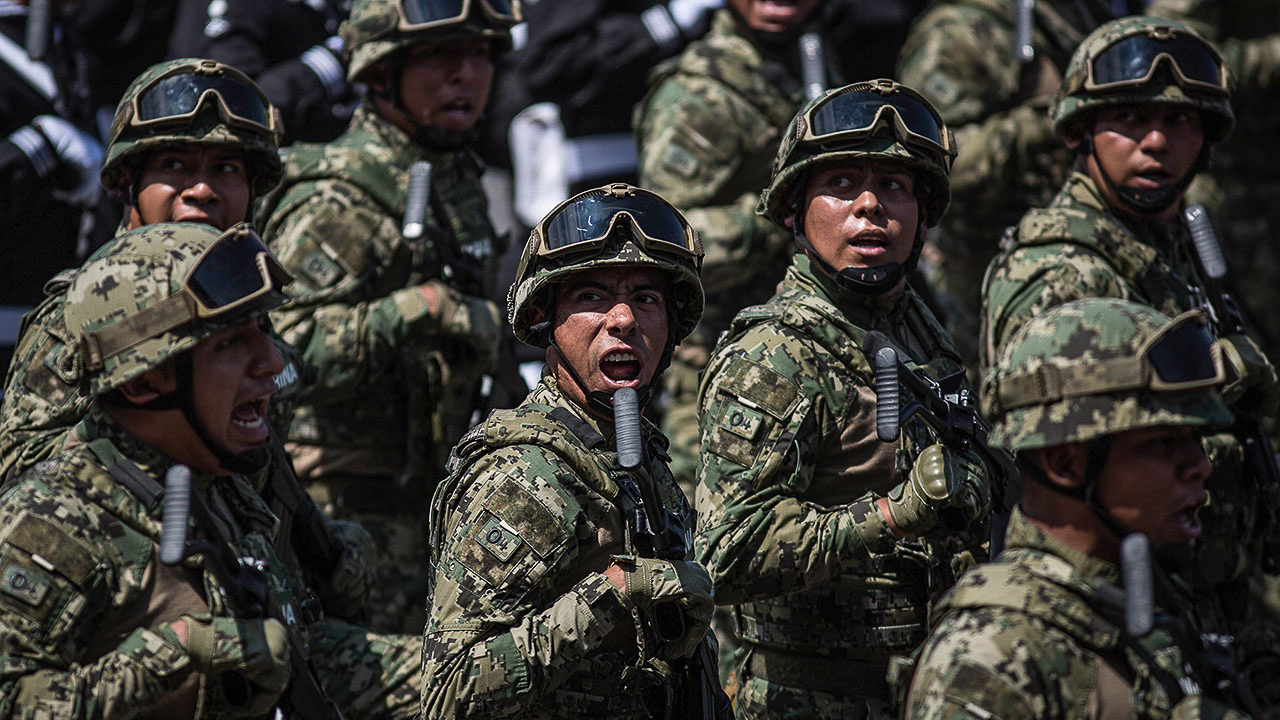
FOCUS: The Fourth…Military Transformation?
15/12/2020I n August, Mike Ryan, director of the World Health Organization (WHO) Health Emergencies Department, pointed out that the magnitude of the COVID-19 pandemic could be underestimated in Mexico due to the low number of tests carried out. He also expressed concern about differences in mortality, when low-income people are five times more likely to die than better-off people. By November, Mexico had more than one million cases and more than 100,000 deaths.
In September, President Andres Manuel Lopez Obrador (AMLO) presented his second government report stating that “we will emerge from the pandemic with a better health system.” Another issue was the economic crisis caused by the pandemic: “the worst is over and now we are on the way up; the lost jobs are already being recovered, they are gradually returning to normal production and we are already beginning to grow”, he said. However, it is estimated that more than 100,000 companies have already gone bankrupt this year, without support or official programs. The Economic Commission for Latin America and the Caribbean (CEPAL), warned that another 500 thousand companies could disappear in the next six months. According to data from INEGI, the Gross Domestic Product (GDP) fell by 18.9%.
In October, civil organizations published the second report “Situation of Indigenous and Comparable Communities Facing the Health Emergency Caused by the SARS-CoV-2 Virus.” They reported a significant increase in cases and deaths compared to the July report: one in three communities has presented infections and 35% of the sick had to be hospitalized. However, it was revealed that the percentage of communities that take protective measures fell from 43% to 25%, which is explained -in part- by economic wear and tear. “We find a strongly rooted distrust in the indigenous people with health institutions, the care provided there and the importance they give to indigenous lives”, the report indicates. The monitoring revealed concern about job insecurity and the “great advance in the control of the cartels.”
Some legislative advances in human rights issues…
In September, Mexico recognized the competence of the UN Committee on Forced Disappearances to hear individual cases. The Miguel Agustin Pro Human Rights Center stated that “it will not only benefit individual cases (…); with the structural recommendations that this body can make (…), the State’s own institutions would be strengthened to confront, in a really effective way, the crisis of disappearances.” Since the beginning of the AMLO government, 1,257 clandestine graves have been detected and 1,957 bodies exhumed, a fact that for the government “is due to the intensification of search efforts.” The authorities consider that “there has been a significant decrease in forced disappearance committed by the authorities. More than 90% are associated with organized crime”, among other advances
In September, the general law to prevent, attend to, and comprehensively compensate forced internal displacement was approved, although the Ministry of Finance reported that there are no resources for it. A few days before, in the framework of the 106th World Day of Migrants and Refugees, the Episcopal Dimension of the Pastoral of Human Mobility of the Catholic Church asked the authorities to address “this phenomenon that, in Mexico, is growing every day due to insecurity and violence generated by organized crime through murder, disappearance, forced recruitment, extortion, robbery, dispossession, threats, harassment or intimidation and fear; extreme poverty, the abandonment in which many especially indigenous communities live and, on many occasions, natural disasters.”
In November the Senate ratified the Escazu Agreement, which seeks to guarantee the rights of access to information, citizen participation, and access to justice in environmental matters. It is an international instrument signed in Costa Rica by 24 countries in 2018. “It is very important for Mexico because it establishes provisions on the generation, dissemination and access to environmental information and addresses the generation of a safe and conducive environment for defenders of human rights in environmental matters”, the United Nations explained.
… and, still, many problems to see to …
In August, AMLO accused civil organizations of receiving money from foreign foundations to oppose his administration’s megaprojects (among them, the Maya Train). The organizations mentioned responded that “megaprojects have exploited and destroyed the territories of indigenous peoples, reducing their autonomy, their ecosystems and the enjoyment of their human rights. Indigenous defense groups and individuals who have opposed the megaprojects have been subjected to multiple attacks and intimidation that in some cases have led to their imprisonment and even their execution.” In the case of the Maya Train, they detailed that “it represents serious risks and environmental, social, economic and patrimonial impacts, as has been warned by communities, academics, organizations and even by instances of the federal government itself. Likewise, it was not decided by the Mayan people (…) but a consultation was carried out without complying with international standards.” They denounced the “campaign to delegitimize the work of civil organizations, through attacks on defense and indigenous organizations, and, recently, through a media campaign that seeks to make international cooperation appear illegal.” They demanded a public apology, as well as guaranteeing the human rights of defenders.
In August, Animal Politico news program revealed that most of the members of the National Guard, which according to the law should be a civilian institution, are made up neither by civilians nor by police, but by military personnel transferred from the armed forces. There is strong concern about the continuity of militarization, particularly after the publication, in May of last year, of the Agreement that establishes that the armed forces will be able to carry out public security tasks (see Focus). Strengthening this same concern, in October, General Salvador Cienfuegos, Secretary of Defense during the administration of President Enrique Peña Nieto, was arrested in the United States, by order of the United States Anti-Drug Agency (DEA). AMLO announced that “all those who are involved in this case, who are acting in the government in National Defense, will be suspended and removed.” However, he affirmed that he is “absolutely convinced that the Armed Forces of Mexico are fundamental institutions for the development of our country.”
In September, Article 19 reported that in the first semester of 2020, 406 attacks against journalists and/or the press were registered, a figure that easily exceeds the 280 attacks registered during the same period in 2019. It explained that “some factors that propagate growth of the aggressions are the intolerance of public officials to public scrutiny, particularly when linked to the pandemic, the repression of protests, as well as the takeover of public power by organized crime.”
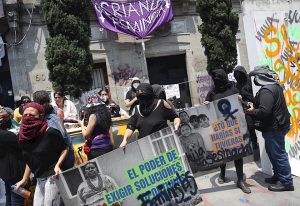
Occupation of the offices of the National Human Rights Commission of the State of Mexico (CODHEM) © Andrea Murcia – Cuartoscuro
In September, a group of relatives of disappeared persons seized the facilities of the National Human Rights Commission (CNDH), in Mexico City, demanding justice. More collectives and organizations joined, even in other states. Protesters changed the official CNDH sign to put in its place “Not One Less Refuge” (Casa de Refugio Ni Una Menos) in order to pressure the authorities to recognize gender violence and implement measures. Solidarity increased after the eviction, in Ecatepec, of women who had taken over the offices of the Human Rights Commission of the State of Mexico (CODHEM). Shortly after, the Secretary of the Interior and the head of the CNDH promised to pay attention to the request of representatives of victims’ groups.
In October, under the justification of redirecting resources to address the health and economic crisis caused by the pandemic and despite doubts, the Chamber of Deputies approved the elimination of several public trusts, including those destined to reparation for victims and the mechanism of protection of journalists and human rights defenders.
EZLN announces that it will go out to “travel the world” in 2021
In October, the EZLN announced that in April 2021 some Zapatista delegations will go out “to travel the world (…) seeking not difference, not superiority, not confrontation, much less forgiveness and pity. We will go to find what makes us equal.” The communiqué says that, “we look at and listen to a sick world (…), fragmented into millions of people alien to each other, bent on their individual survival, but united under the oppression of a system ready to do anything to satisfy its thirst for profit, even when it is clear that its path goes against the existence of planet Earth.” The first continent to visit will be Europe, where they intend to reach “the Spanish capital, on August 13, 2021”, 500 years after the supposed conquest of what is now Mexico. “We are going to tell the people of Spain two simple things: “They didn’t conquer us. That we continue in resistance and rebellion”, the EZLN said. “That they don’t have to ask us to forgive them anything. Enough playing with the distant past to justify, with demagoguery and hypocrisy, current and ongoing crimes: the murder of social fighters (…); the genocides hidden behind megaprojects”, it added.
CHIAPAS: It never rains but it pours
In November, an Emergency Declaration was issued in Chiapas due to severe rains caused by the tropical depression “Eta”, which caused more than 20 deaths, several collapses and landslides. That added to a long list of problems, already exacerbated by the health, economic and social impacts of the pandemic.
In recent months, there has been an increase in violent situations: in September, three people were killed and six injured were the result of an “attack”, according to some media, and “confrontation”, according to others, which took place in Tila, between ejidatarios and dissatisfied residents. For five years, the ejidatarios recovered, by legal means, their territorial rights with which the municipal seat was transferred to the community of El Limar. The Vicarage of Justice and Peace of the Diocese of San Cristobal recalled that “almost three weeks ago a group of residents from the Tila ejido carried out blockades at the main entrance and in other sections near the town. (…) We know that there was the intention of a process of dialogue and negotiation to seek a solution to the conflict, but apparently the situation got out of control.” The Tila ejido reported that the situation of violence was detonated when “a group of ejidatarios went to unblock the barricade and they were met with bullets.”
Another case: despite the signing of a non-aggression pact in July, repeated firearm attacks have continued to be reported between the municipalities of Aldama and Santa Martha, Chenalho, as a result of a 60-hectare agrarian conflict, that has left around 25 dead, dozens displaced and injured. In August, a video was released showing an alleged armed civil group from the municipality of Chenalho. Frayba has reiterated “that the government of Chiapas has ignored the humanitarian crisis in the Altos region by being permissive with the paramilitary civil armed groups of Chenalho.” For its part, the Digna Ochoa Human Rights Committee blames the violence “on armed groups that operate from the side of the Aldama municipality.”
Also, in the Highlands of Chiapas, in October, three years after the forced displacement of more than 5,000 people, the Chalchihuite Committee denounced that in Chalchihuitan “the paramilitary attacks of Chenalho and Rutilio Escandon Cadenas, current governor of Chiapas, have not complied with any of their demands, nor the recommendations of the National Human Rights Commission, nor the precautionary measures of the Inter-American Commission on Human Rights.”
On another note, in August, two EZLN support base coffee warehouses were burned in the Moises Gandhi community, Ocosingo municipality, by alleged members of the Ocosingo (ORCAO) Coffee Growers Regional Organization. This occurred within the framework of the dispute over land recovered in 1994 between the two organizations. In November, the Good Government Council (JBG) of Nuevo Amanecer en Resistencia y Rebeldia por la Vida y la Humanidad denounced the “kidnapping and torture of a fellow Zapatista support base” by members of the ORCAO. It mentioned that organizations that defend human rights have witnessed violence in the area while carrying out a humanitarian and documentation caravan, which reached Moises Gandhi and Nuevo San Gregorio in October. This caravan observed the “attacks, threats and harassment perpetrated by armed groups” and reported that “while the caravan was touring the area, more than nine shots were heard.” Faced with the kidnapping, a demonstration was held in Mexico City “to repudiate this new paramilitary aggression against the Zapatista support bases, denounce the complicity of the municipal, state and federal governments with the attackers, and demand that the Lopez Obrador government put an end to “the war against the Zapatistas” and the indigenous communities that oppose their megaprojects.” The kidnapped person was released the next day.
In another situation of violence, in October, ejidatarios of San Sebastian Bachajon demonstrated against the construction of a National Guard (GN) barracks in Chilon. They warned that “when the Zapatista movement began (…), the federal government in turn installed military bases in different communities (…) resulting in a high rate of murders, raped, pregnant and abandoned women, separation of marriages, abandoned children, an increase in alcoholism, drug addiction and prostitution, as well as the spread of organized crime and insecurity.” They called for the immediate removal of the municipal president of Chilon and the communal commission of San Sebastian Bachajon “for having signed an agreement to install a National Guard base (…) without consulting the inhabitants.” According to Frayba, around 300 police officers and elements of the National Guard repressed the peaceful mobilization. Two people were arbitrarily deprived of their liberty and others were injured.
Impunity: the origin of current violence?
In September in Mexico City, the Act of recognition of the State’s responsibility in the case of the Acteal massacre (1997) was held. In it, a group of victims participated who decided to sign a Friendly Settlement Agreement within the framework of the lawsuit filed before the Inter-American Commission on Human Rights (IACHR) in 2005. The Undersecretary for Human Rights, Alejandro Encinas, admitted that the attack was perpetrated by “paramilitary groups with the complacency of the authorities.” He reported that the Agreement includes 18 deceased victims and 12 survivors, thus “the rights of those who await a thorough resolution of the Inter-American Court of Human Rights are preserved.” This was in contrast to what was raised by the Foreign Ministry in this same event, in the sense that this Agreement “will put an end to the litigation process before the IACHR”, another group of victims, Las Abejas de Acteal Civil Society and 44 organizations from ten countries, expressed that the agreement by some victims is a “legitimate decision that we do not intend to judge”, but they asked “to avoid the construction of an erroneous image”, in the sense that “the case is already resolved.” They also expressed their “concern regarding the 15 years of litigation of this case before the IACHR with a slow visible progress and enormous wear on the victims and their families.” Later, Las Abejas de Acteal Civil Society affirmed that “a public apology is not enough.” It questioned: “If you were really so interested in peace and equality, why do you continue to guarantee impunity to the paramilitaries? Why are there still deaths and injuries from high caliber bullets in Aldama and Tila?” They affirmed: “if there is no punishment, if they do not see negative consequences of the crimes they commit, the paramilitaries will continue to be emboldened.”
OAXACA: Defense of Mother Earth, heart of multiple defense processes
According to information released in October, the Canadian company Minaurum Gold requested permission to explore 6,410 hectares of the Chimalapas Forest for the extraction of gold and copper. More than 300 references from the academic and artistic world, as well as 60 organizations stressed that “we cannot allow the desire for enrichment of a privileged minority and the excessive demands for materials of industrial society to serve as an excuse to end such a valuable heritage.” They warned that “these extractive activities would generate enormous environmental impacts in one of the most biodiverse places on the planet.” Authorities of San Miguel Chimalapa also made clear their rejection of mining exploitation in their territory.
In October, one year after the signing of agreements between the National Water Commission (CONAGUA) and 16 Zapotec communities of the Central Valleys of the Coordinator of United Peoples for the Care and Defense of Water (COPUDA), said organization closed the CONAGUA offices to report non-compliance. The agreements sought to “recognize the territorial rights of the communities and the participation of the communities in the administration of groundwater through internal community regulations.”
Also, in October, Zapotecs from Union Hidalgo filed a civil lawsuit in the Paris Court against Electricité de France (EDF) for “multiple violations of their rights” requesting the suspension of the Gunaa Sicaru wind farm project. They claimed that the residents have not been consulted. They blamed the company for contributing to “an escalation of violence against human rights defenders (…) by groups close to EDF.”
In other aspects of human rights, in August, two years after the declaration of the Gender Violence Alert (GVA) in 40 municipalities of the state, the “Rosario Castellanos” Women’s Studies Group (GESMujer) warned that, with 458 cases since its inception, the administration of Governor Alejandro Murat “is shaping up to be the one with the greatest femicidal violence in recent history.” 243 of these cases occurred since the beginning of the GVA. 62% of violent murders of girls and women occurred in municipalities with the alert, “which reflects that due to the lack of forceful actions (…), it has not been possible to stop femicidal violence and, even more, that it is being extended to municipalities not considered at risk.” GESMujer declared that “the GVA is a mechanism that made it possible to make visible (…) the high levels of violence against women and girls, but also made visible the serious institutional shortcomings.”
GUERRERO: Between denunciations and mobilizations
September marked the sixth anniversary of the serious human rights violations committed against the students of the Ayotzinapa Normal Rural School, which included the forced disappearance of 43 of them. In this framework, AMLO promised that those responsible will be punished. He gave details of progress, such as the searches, the 80 people arrested in addition to the arrest warrants against the military, police and officials. The UNHCHR recognized “the important achievements made”, while encouraging “the Mexican State to intensify its efforts in order to achieve full clarification of the case.” In November, Jose Martinez Crespo, the first military officer allegedly linked to the case, was arrested.
In other aspects of human rights, in September, civil organizations demanded that the authorities stop the criminalization of the “Jose Ma. Morelos y Pavon” Regional Center for the Defense of Human Rights. They recalled that the municipal president of Leonardo Bravo vetoed the entry of members of the Center in Chichihualco, “where this organization has accompanied families displaced by violence and the presence of organized crime for more than a year and a half.” They expressed concern over speeches “by public servants who, based on hate speech and slander (…), seek to discredit the work of organizations and individuals that defend human rights.”
In September, the Guerrero Front for Our Disappeared, published the letter it sent to authorities in which it detailed the conditions they have experienced, the lack of security for defenders, the lack of protection for journalists, and the obstruction of access to the truth and justice, stopped searches and investigations and poor attention to victims.
Likewise, in September, 2,000 indigenous and Afro-Mexican citizens of Guerrero marched in Chilpancingo, to demand the constitutional recognition of their rights through the approval of the bill that was presented in December of last year. They denounced that the National Guard held the protesters for 30 minutes at the entrance to Chilapa de Alvarez, so that they would not reach the capital.
In October, a year after the murder of the leader of La Montaña Popular Front (FPM), Arnulfo Ceron, a rally was held in Tlapa to demand justice. The Tlachinollan Human Rights Center pointed out that “several material authors and some intellectual ones are being prosecuted for the cunning crime. The attack (…) evidenced the impunity with which organized crime kidnapped, killed and disappeared people.” It affirmed that “the challenge of the authorities will be (…) to take advantage of the situation in the Arnulfo case to create the conditions that prevent organized crime from re-taking root in the mountain with its stream of violence and death.”

